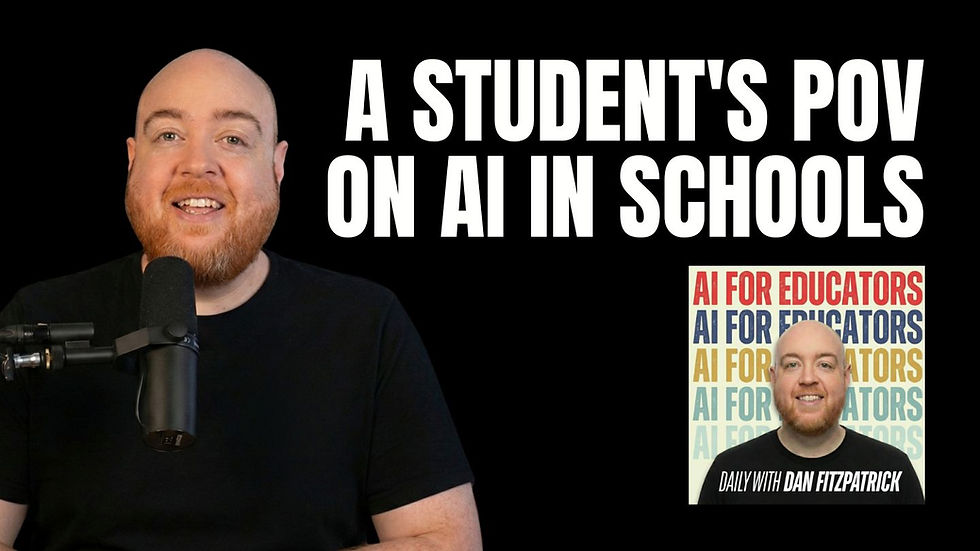5 Questions For Ambitious Leaders Driving Change In Education
- Jun 29, 2024
- 4 min read
The education system traditionally operates as a finite game.
In his book Finite and Infinite Games, the American academic James Carse explains that finite games have fixed rules, clear objectives and defined endpoints. But infinite games are ongoing, evolving and focused on continuous play.
The education system exemplifies a finite game. It is driven by standardized tests and obsessed with end-point examinations. To transform it, we must reframe it as an infinite game that encourages long-term sustainability, adaptability and a love for lifelong learning.
The Finite Game Of Education
In the current system students, teachers, administrators and policymakers are the key players in the finite game. Each player has defined roles and responsibilities. The boundaries of this game are set by rigid curriculum guidelines, fixed school years and standardized testing protocols. Success is measured by a grade point average. The focus is often on short-term achievements and memorization. This turns education into a competition among students and schools.
As James Carse explained, “A finite game is played for the purpose of winning, an infinite game for the purpose of continuing the play.”
The current system's finite nature drives a win-lose mentality where the ultimate goal is to succeed in exams and move on. This provides structure and clear goals. But it has huge drawbacks. It can stifle creativity, discourage critical thinking and create immense pressure on students to perform well on tests rather than truly understand the material. It fails to prepare students for the unpredictable and rapidly changing world beyond school.
The Infinite Game Of Education
Transforming education into an infinite game requires a new strategy. The focus must move from achieving short-term results to fostering lifelong learning, critical thinking and adaptability. Creating a system that continuously evolves and improves is now an imperative. Encouraging students to develop a love for learning that lasts a lifetime is the new mark of success.
In the infinite game of education, the players are an expanding community that includes not only students and educators but also parents, employers and society at large. Participants change and evolve over time, contributing to a dynamic and inclusive educational ecosystem. As Carse notes, “Finite players play within boundaries; infinite players play with boundaries.” The boundaries of this game are flexible, with curricula that adapt to the needs and interests of students and societal changes.
The duration of the infinite game of education is endless. Learning continues throughout life, beyond formal schooling. Success is measured not by grades or test scores but by the ability to think critically, solve problems, adapt to new challenges and contribute positively to society. The focus is on personal growth and societal contribution rather than competition and definitive outcomes.
Implications For Transforming Education
Curriculum Flexibility:
To foster an infinite game mindset, curricula must be adaptable and responsive to the changing needs of students and society. This involves encouraging interdisciplinary learning and critical thinking rather than rote memorization. Subjects should be integrated, showing students the connections between different areas of knowledge and how they apply to real-world problems. As Carse insightfully states, “Only that which can change can continue.”
Assessment Methods:
Moving beyond standardized tests is crucial. Diverse forms of assessment, such as project-based learning, peer reviews, and self-assessments, can provide a more comprehensive view of a student’s abilities. These methods encourage deep understanding and application of knowledge rather than superficial memorization.
Lifelong Learning:
Promoting the idea that education does not end with graduation is essential. Lifelong learning can be encouraged through professional development opportunities, community learning initiatives, and online courses. By fostering a culture of continuous improvement, individuals remain adaptable and skilled in a rapidly changing world.
Inclusive Participation:
Involving a broader range of stakeholders in the educational process ensures the system remains relevant and effective. This includes input from students, parents, industry leaders, and community members. By considering diverse perspectives, education can better meet the needs of all learners and society as a whole.
Focus On Skills For The Future:
Prioritizing the development of skills such as critical thinking, emotional intelligence, digital literacy, and adaptability is crucial. These skills prepare students for the uncertainties of the future and equip them to navigate complex challenges.
A Fundamental Shift
Viewing education as an infinite game requires a fundamental shift from short-term achievement to long-term growth and adaptability. By adopting this perspective, we can create an education system that not only prepares individuals for specific tasks or tests but also equips them with the skills and mindset necessary to thrive in an ever-evolving world. This transformation is essential for fostering a society that values continuous learning, innovation and collective well-being.
As we embrace the infinite game of education, we open the door to endless possibilities, where learning is a lifelong journey and the goal is not just to win but to keep playing, growing and contributing to a better future for all.
5 Game Changing Questions
How can we shift our focus from winning (e.g., achieving high test scores) to continuing the play, ensuring education is a lifelong journey of discovery and growth?
In what ways can we play with boundaries instead of within them by creating a more flexible and adaptive curriculum that evolves with the needs of our students and society?
How can we cultivate a learning culture that values ongoing change and adaptation, recognizing that 'only that which can change can continue'?
What new and innovative assessment methods can we introduce to measure not just what students know but also how they think, solve problems and adapt to new challenges?
How can we ensure that our educational practices and policies are not just preparing students to win in the short term, but equipping them with the skills and mindset to thrive in an infinite game?


